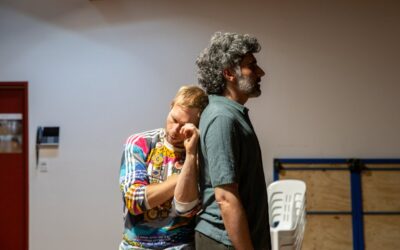The ground-breaking triple Olivier Award-winning play Emilia will make its Australian debut at Arts Centre Melbourne from 10 – 27 November. Inspired by the life of the 17th century poet and feminist Emilia Bassano, this Morgan Lloyd Malcolm work features a team entirely made up of women and non-binary creatives from diverse cultural backgrounds.
Brought to the Arts Centre by Essential Theatre, co-founder and actor Amanda LaBonté is not shy when it comes to expressing her sheer joy and passion for the project.
“Yep, you certainly got that right – I am extremely passionate about this work, she says. “I think back to when I first heard the final speech played. I was crying and smiling at the same time without actually realising what effect it had on me. It spoke to me directly – Emilia didn’t take no for an answer, she was unapologetic, she fought against all odds. This woman, and this work directly inspires me to keep strong, to keep working for equality and not to be ashamed of my voice – I mean, what a gift!. Her voice fuelled me instantly and I think it will do the same for all audiences – men, non binary and women audiences will all feel the call to arms. When you watch a character move through a play with conviction and continue to defy the “system” it’s pretty hard to be moved. And she does it with dignity, with humour, with an open heart and with an inner strength that’s so admirable.”
LaBonté explains that the work tells us not to give up, and to not hide from the hard things in life.
“I think it’s easy to see injustice and whinge about it,” she says. “Emilia doesn’t whinge, she does.”
It’s 1609. Emilia Bassano is a writer, wife, lover, mother and muse. All she wanted was her voice to be heard. Could she have been the ‘Dark Lady’ of Shakespeare’s sonnets? What about her own poems? Why was her story erased from history?
In the 16th century Emilia was a woman with a dream, and more than that, a coloured woman with a dream, in a white man’s world. The injustices she experienced unfortunately are not dissimilar to what women around the world are still battling with 400 years on- we only have to look at our headlines and the recent major movements that have swept through our society. Through a clever mash up of classic and contemporary, and a beautiful combination of humour and passion, Emilia tackles the big inequalities that women are dealing with daily.
“It’s so important to see these stories on our stage – it’s great to go and see a kitchen drama or a fun filled musical, the entertainment is sometimes just what we need,” says LaBonté . “But theatre can do more than that – it can provoke change. It makes you feel all the feels, and when you’re in the auditorium riding the journey with these incredible characters, there is nowhere to hide, you are called to feel, think, question and perhaps evoke some change – no matter how big or small.”
Inspirationally, the work is described as a champion for woman but how important is this concept in the world of the arts generally and theatre in particular? Theatre has a profound and lasting history in its ability to be a catalyst for change – a vital ingredient that LaBonté has witnessed first hand.
“Recently I was an audience member of Raisin in the Sun. I was sitting beside a woman and her daughter. At the end of the play, they were both visibly moved, tears streaming down their faces. This woman, whom I’d never met, looked at me and said “My goodness, it makes you think doesn’t it? I don’t think I’ve ever really thought about it like this before” And that’s exactly why we continue to place these tales on the stage. They can be a catalyst for change. They can provoke conversations. If even a handful of people leave Emilia each night with a new way of thinking about how they treat women, or how they treat their fellow neighbour, then we have done our job. It is so important that we continue to challenge ourselves as artists, and consequently our audiences – and I think Emilia challenges, provokes, and wins you over with heart and humour.”

As well as producing the show, LaBonté is also a cast member and says that after nearly 3 years of working on the project, she feel so lucky to be able to share the stage with 13 extraordinary performers and tell the story – “I think I might self combust with pride, relief and joy on Opening Night!!”
Playwright Morgan Lloyd Malcolm was part of The Apathists – a collective of British playwrights who staged plays and happenings in London between March 2006 and March 2007. The events generated a cult following on the London theatre scene. Malcolm was commissioned to write Emilia for the Shakespeare Globe. LaBonté describes Malcolm’s writing as accessible. “She has this skill of weaving poetical sophisticated language into the everyday conversation. It’s a wonderful mash up of style and I think the result is a glorious celebration of language. I think she also weaves humour brilliantly into what could be a heavy tale. By choosing a large cast – a cast of 13 – there is an already established atmosphere with what could feel like a “chorus” at times. The shifts from intimate and private storytelling to the larger ensemble moments are poignant throughout the work, and help elevate the drama. ”
It is not surprising to learn that as a creative LaBonté loves stories that take her somewhere , lift her from the everyday and make her feel. LaBonté admits to loving a good narrative, a character arc, something she can get her teeth into, run away with and dive into the journey with them. “I go to the theatre, and I work in the theatre, because I love the shared experience between artist and audience,” she says. “I also love stories that provoke and challenge me and others to examine ourselves – you know those brilliant works you’ve seen, and for days after you are still turning it over in your mind and heart. I love that.”
The passion of LaBonté and creative collaborator Sophie Lampel lead them to create Essential Theatre 20 years ago. In that time they have explored and played with a range of Shakespeare’s works, in particular with the company’s national program, Shakespeare in the Vines. “We have spent our time examining Shakespeare through a female lens – ensuring gender equity in casts that predominantly were male heavy, playing with gender swaps, and on one occasion retelling one of his tales through the eyes of the heroine,” explains LaBonté. “We were drawn to Shakespeare’s works because of our love of his language and the deep universal themes that run through these timeless tales … however we struggled with some the inequities of the work. It was wonderful to have the opportunity to play with this.
Soph and I were looking for something special to mark the milestone of our 20th anniversary -as independent artists we truly can’t believe we are still standing – and we both wanted to mark the occasion with something remarkable. We were thrilled when Emilia was brought to attention – it was like the stars aligned. The fact that this play was commissioned by The Globe, examines Shakespeare’s time through the eyes of a dynamic women and that the entire cast and creative team are made up of female and non binary artists – we couldn’t believe our eyes.”

So, says LaBonté, let theatre move you, make you laugh, make you think, make you feel – be brave enough to get off the couch and leave the streaming platforms, come and let live theatre be part of your world again! Emilia will tickle you, challenge you and delight.
Fierce and provocative, Emilia is the perfect mix of comedy and fury; a rollicking ride that takes audiences on an exuberant and moving journey though love, loss, identity, ambition, power, rebellion and what it is to be a woman in a man’s world.
artscentremelbourne.com.au
Images: Pia Johnson




